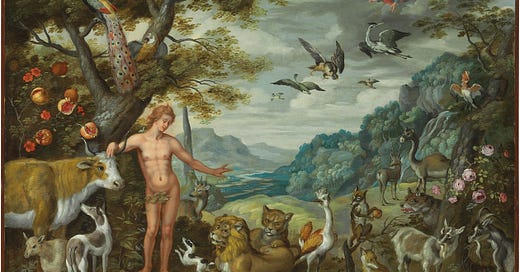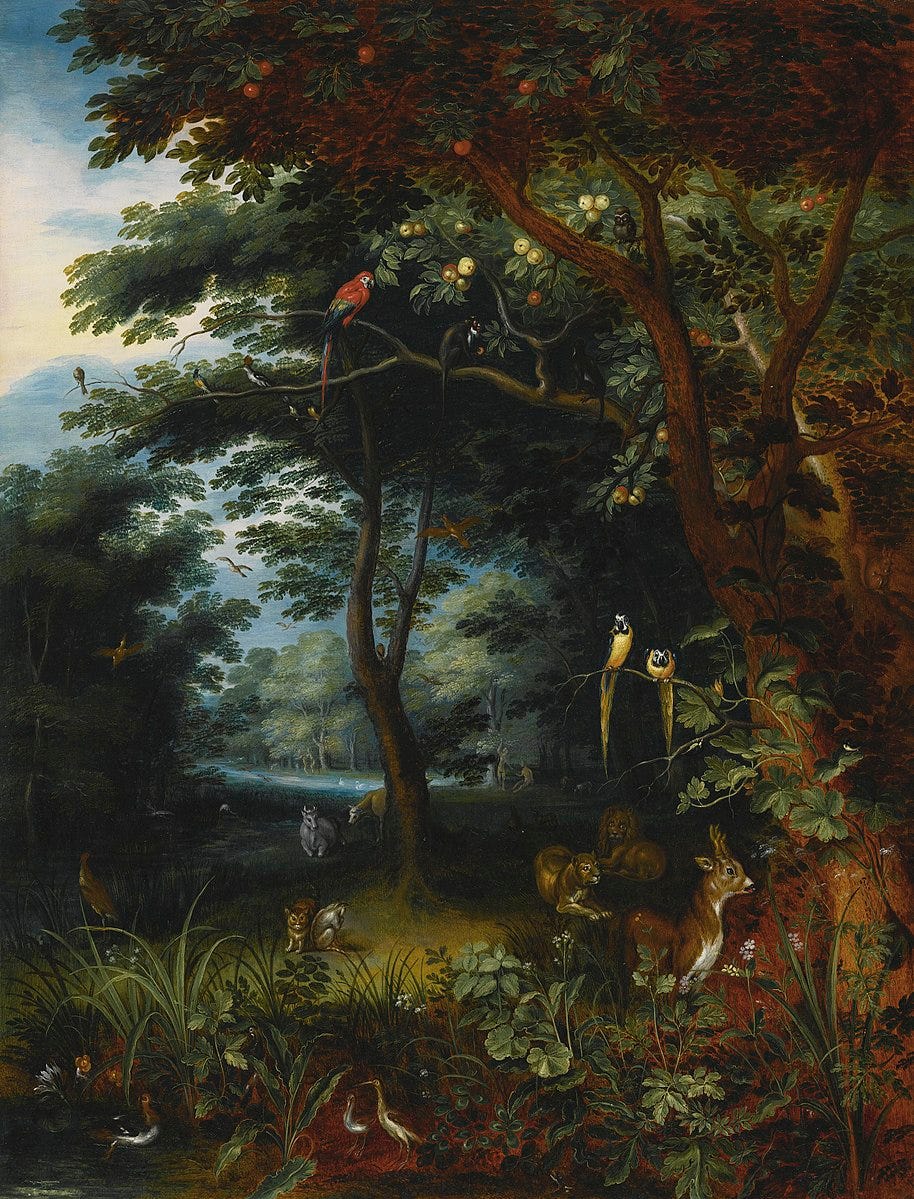grateful for work and tired still. I thought I’d reflect on this passage from Genesis and hopefully draw out some
a passage for contemplation from Genesis:
Now no shrub of the field had yet appeared on the earth, nor had any plant of the field sprouted; for Yahweh had not yet sent rain upon the earth, and there was no man to cultivate the ground. But springs welled up from the earth and watered the whole surface of the ground. Then Yahweh formed man from the dust of the ground and breathed the breath of life into his nostrils, and the man became a living being.
And Yahweh planted a garden in Eden, in the east, where he placed the man he had formed. Out of the ground Yahweh gave growth to every tree that is pleasing to the eye and good for food. And in the middle of the garden were the tree of life and the tree of the knowledge of good and evil. Now a river flowed out of Eden to water the garden, and from there it branched into four headwaters…
Then Yahweh took the man and placed him in the Garden of Eden to cultivate and keep it.
I am regularly reminding myself that work was in the garden in the beginning. our normal experience of work would seem to suggest otherwise… that Eden was a place of play and repose and delight! and I’m sure it was. but it was certainly also a place where work was called “good”, before any corruption came into the picture.
the sweat and toil of it came later.
originally, cultivation—taking the raw sauce of creation and making things with it—was Adam’s lot.
it seems like God made some things to grow, but that in general the earth was like a blank canvas that Adam was to partner with God in cultivating. Adam didn’t bring the water, he didn’t make the soil, he didn’t grow the seeds or start the plants twisting upward towards the sun. but he was to take care of the garden and make it more fruitful.
something else I hadn’t noticed, was that, as Adam was drawn from and formed from the earth (heck, “adam” means “soil, earth, ground”), when he is given to cultivate the earth, he is symbolically tasked with cultivating himself. “Adam” is earth stuff, and he is meant to cultivate earth stuff, and make it fruitful.
it’s interesting that Adam was working and learning about the patterns of creation before Eve comes into the picture. what might that be saying (if anything)?
I also love rolling in my hands the thought that, when God fashioned the earth, he gave the veins of springs flowing out to give water to the ground… what might that mean in the way he fashioned us?
and I tend to think the scriptures are most helpful when I look for original divine intent… the roots of things. how things, perhaps, were meant to be in their seed form helps me to orient my thoughts and my life.
and from this passage, I can engage with some ideas:
we are not alone
we are provided for
it is good and fulfilling to work
cultivating the earth suggests cultivating ourselves
if (when) I am feeling tired, I try to remind myself—work is tiring, and work is good. I don’t know if you have an image of this to fall back on… but I used to mow lawns in high school and I never looked forward to it, I always sang and my imagination ran wild while I was doing it, and when I was finished I would look back on the lines of the yard with a sense of fulfillment.
a loud, gas-powered experience of cultivating the garden.
and maybe there’s something to the idea that when we give our hands to partnering with God in making the world fruitful, our interior life is cultivated, and we too thrive and are made more beautiful.
consider the lilies… consider the sparrows…
whatever your hand finds to do, do it with your might; for there is no work, nor device, nor knowledge, nor wisdom, in the grave, where you are going.
whatever you do, work at it with all your heart, as working for the Lord, not for human masters, since you know that you will receive an inheritance from the Lord as a reward.
I thought I’d share a couple poems that touch/flow out from these themes:
1
one whole man
what must it be like to be one whole man
to walk above the earth
without a hint of self-betrayal
to look into the mirror
without worry over the forked branching wrinkles, self-inflicted
to be guileless, like an animal,
but noble and self-possessed as a god
to have put off enough false selves
that you again feel the humid warmth
of standing naked and unashamed
wearing nothing, fearing nothing
passion and virtue breathing in you, in unison
and lacking no good thing
2
my amphorae for those who work in clay down near the river I’m bent over hands dark, caked with mud separating clay from raw earth piling it into a basket and carrying it home on my shoulder my potter’s wheel spins into the night I stop to finish them then I fire and wait when they emerge from the oven each one is imperfect I see the little flaws, flaws I’m trying to rid from my own hands but each one is useful morning comes and I try to give them away all go, most are used and most are broken before I die some last, imperfections borne forth on one of time’s gentler hands but if you find one of the many shattered don’t throw it away yet, deeming it useless but turn it over in your hands, and look— while the vessel may have failed perhaps the writing still remains I left a message for you
thanks for being here. I write weekly sharing poetry, songs, musings, thoughts on creative life, and hopefully some encouragement… my first collection of poetry, Snowmelt to Roots, is available in my shop, (or on Amazon). and my music is available here.
peace,
Z






"to be guileless, like an animal,
but noble and self-possessed as a god"